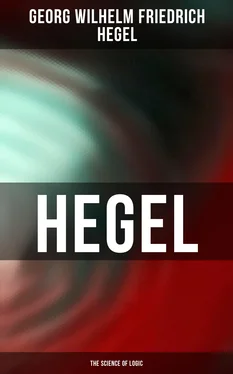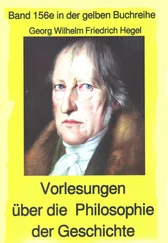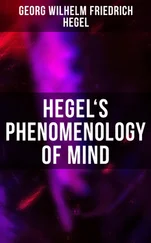1 ...6 7 8 10 11 12 ...17 21.] (b) Thought was described as active. We now, in the second place, consider this action in its bearings upon objects, or as reflection upon something. In this case the universal or product of its operation contains the value of the thing—is the essential, inward, and true.
In § 5 the old belief was quoted that the reality in object, circumstance, or event, the intrinsic worth or essence, the thing on which everything depends, is not a self-evident datum of consciousness, or coincident with the first appearance and impression of the object; that, on the contrary, Reflection is required in order to discover the real constitution of the object—and that by such reflection it will be ascertained.
To reflect is a lesson which even the child has to learn. One of his first lessons is to join adjectives with substantives. This obliges him to attend and distinguish: he has to remember a rule and apply it to the particular case. This rule is nothing but a universal: and the child must see that the particular adapts itself to this universal. In life, again, we have ends to attain. And with regard to these we ponder which is the best way to secure them. The end here represents the universal or governing principle: and we have means and instruments whose action we regulate in conformity to the end. In the same way reflection is active in questions of conduct. To reflect here means to recollect the right, the duty,—the universal which serves as a fixed rule' to guide our behaviour in the given case. Our particular act must imply and recognise the universal law.—We find the same thing exhibited in our study of natural phenomena. For instance, we observe thunder and lightning. The phenomenon is a familiar one, and we often perceive it. But man is not content with a bare acquaintance, or with the fact as it appears to the senses; he would like to get behind the surface, to know what it is, and to comprehend it. This leads him to reflect: he seeks to find out the cause as something distinct from the mere phenomenon: he tries to know the inside in its distinction from the outside. Hence the phenomenon becomes double, it splits into inside and outside, into force and its manifestation, into cause and effect. Once more we find the inside or the force identified with the universal and permanent: not this or that flash of lightning, this or that plant—but that which continues the same in them all. The sensible appearance is individual and evanescent: the permanent in it is discovered by. reflection. Nature shows us a countless number of individual forms and phenomena. Into this variety we feel a need of introducing unity: we compare, consequently, and try to find the universal of each single case. Individuals are born and perish: the species abides and recurs in them all: and its existence is only visible to reflection. Under the same head fall such laws as those regulating the motion of the heavenly bodies. To-day we see the stars here, and to-morrow there: and our mind finds something incongruous, in this chaos—something in which it can put no faith, because it believes in order and in a simple, constant, and universal law. Inspired by this belief, the mind has directed its reflection towards the phenomena, and learnt their laws. In other words, it has established the movement of the heavenly bodies to be in accordance with a universal law from which every change of position may be known and predicted. The case is the same with the influences which make themselves felt in the infinite complexity of human conduct. There, too, man has the belief in the sway of a general principle.—From all these examples it may be gathered how reflection is always seeking for something fixed and permanent, definite in itself and governing the particulars. This universal which cannot be apprehended by the senses counts as the true and essential. Thus, duties and rights are all-important in the matter of conduct: and an action is true when it conforms to those universal formulae.
In thus characterising the universal, we become aware of its antithesis to something else. This something else is the merely immediate, outward and individual, as opposed to the mediate, inward and universal. The universal does not exist externally to the outward eye as a universal. The kind as kind cannot be perceived: the laws of the celestial motions are not written on the sky. The universal is neither seen nor heard, its existence is only for the mind. Religion leads us to a universal, which embraces all else within itself, to an Absolute by which all else is brought into being: and this Absolute is an object not of the senses but of the mind and of thought.
22.] (c) By the act of reflection something is altered in the way in which the fact was originally presented in sensation, perception, or conception. Thus, as it appears, an alteration of the object must be interposed before its true nature can be discovered.
What reflection elicits, is a product of our thought. Solon, for instance, produced out of his head the laws he gave to the Athenians. This is half of the truth: but we must not on that account forget that the universal (in Solon's case, the laws) is the very reverse of merely subjective, or fail to note that it is the essential, true, and objective being of things. To discover the truth in things, mere attention is not enough; we must call in the action of our own faculties to transform what is immediately before us. Now, at first sight, this seems an inversion of the natural order, calculated to thwart the very purpose on which knowledge is bent. But the method is not so irrational as it seems. It has been the conviction of every age that the only way of reaching the permanent substratum was to transmute the given phenomenon by means of reflection. In modern times a doubt has for the first time been raised on this point in connexion with the difference alleged to exist between the products of our thought and the things in their own nature. This real nature of things, it is said, is very different from what we make out of them. The divorce between thought and thing is mainly the work of the Critical Philosophy, and runs counter to the conviction of all previous ages, that their agreement was a matter of course. The antithesis between them is the hinge on which modern philosophy turns. Meanwhile the natural belief of men gives the lie to it. In common life we reflect, without particularly reminding ourselves that this is the process of arriving at the truth, and we think without hesitation, and in the firm belief that thought coincides with thing. And this belief is of the greatest importance. It marks the diseased state of the age when we see it adopt the despairing creed that our knowledge is only subjective, and that beyond this subjective we cannot go. Whereas, rightly understood, truth is objective, and ought so to regulate the conviction of every one, that the conviction of the individual is stamped as wrong when it does not agree with this rule. Modern views, on the contrary, put great value on the mere fact of conviction, and hold that to be convinced is good for its own sake, whatever be the burden of our conviction,—there being no standard by which we can measure its truth.
We said above that, according to the old belief, it was the characteristic right of the mind to know the truth. If this be so, it also implies that everything we know both of outward and inward nature, in one word, the objective world, is in its own self the same as it is in thought, and that to think is to bring out the truth of our object, be it what it may. The business of philosophy is only to bring into explicit consciousness what the world in all ages has believed about thought. Philosophy therefore advances nothing new; and our present discussion has led us to a conclusion which agrees with the natural belief of mankind.
23.] (d) The real nature of the object is brought to light in reflection; but it is no less true that this exertion of thought is my act. If this be so, the real nature is a product of my mind, in its character of thinking subject—generated by me in my simple universality, self-collected and removed from extraneous influences, —in one word, in my Freedom.
Читать дальше












